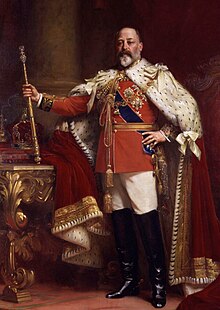A History of the British Monarchy/Saxe-Coburg-Gotha Rulers
The House of Saxe-Coburg Gotha was made the royal house in 1901 when Queen Victoria died and Edward VII (Albert Edward), who used his fathers family name and herediatary house as his own.

Edward VII, Queen Victoria's eldest son, was the first Saxe-Coburg-Gotha monarch. He ascended on 22 January 1901. In the beginning of his reign, he reintroduced rituals such as the State Opening of Parliament that his mother had eliminated. In 1904, a remarkable achievement, the Entente Cordiale, allying Britain and France occurred and ended the "Splendid Isolation" of Britain from Continental politics. Due to this, Edward is popularly known as the Peacemaker. His later reign was marked by the constitutional crisis over the People's Budget proposed by Prime Minister H.H. Asquith. The budget introduced by the Commons was vetoed by the Lords in November 1909, causing an election in January 1910. The new Parliament made plans to remove the Lords' veto power, and did with the passage of the Parliament Act of 1911. However, Edward did not live to see this, dying on 6 May 1910 at Buckingham Palace. His funeral on 20 May was attended by nine European monarchs, almost all related to the man known as the "Uncle of Europe".

Edward was succeeded by his son George, who become George V. George inherited the political situation his father had left behind. Negotiations over the budget eventually broke down, and he was forced to call an election in December 1910. In 1911, the Parliament Act was passed removing the power of the Lords, with few exceptions, to veto bills. The next crisis concerned Irish Home Rule. Legislation was introduced to grant this, but the Conservatives and the Unionists were staunchly opposed. In July 1914, George held a meeting at Buckingham Palace between the political parties to negotiate over the issue. The negotiations were fruitless, but on 18 September the Home Rule Bill was granted assent. However, it was delayed due to World War I. This was a personal crisis for George, as many of his relatives were German and supported Kaiser Wilhelm II, the symbol of German aggression to the British people and George's first cousin. Thus, on 17 July 1917, George, by Royal Proclamation, changed the Royal House and family to be "Windsor" rather than "Saxe-Coburg-Gotha", due to the Germanic reference. He also asked all members of the Extended Royal Family to relinquish their Germanic titles, which was completed by the Duke of Teck (Marquess of Cambridges), Prince of Battenberg (Marquess of Milford Haven) and Count von Gleichen.